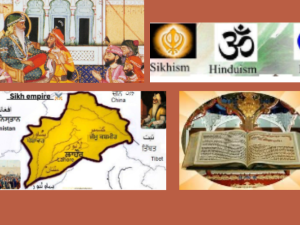Guru Nanak's educational philosophy encompasses a rich tapestry of values and principles that resonate deeply with the aspirations of contemporary education. By embracing the ideals of holistic development, equality, service, universalism, empowerment, ethics, and environmental consciousness, educational institutions can actualize Guru Nanak's vision of education as a transformative force for individual and societal flourishing. Through concerted efforts to integrate these multifaceted dimensions into educational practice, we honor the legacy of Guru Nanak and pave the way for a more enlightened and compassionate world.
Introduction
Guru Nanak, the founder of Sikhism, was a spiritual leader and a profound thinker whose teachings encompassed various aspects of life, including education. His philosophy on education goes beyond mere knowledge imparting; it emphasizes individuals' holistic development, fostering a sense of social responsibility and promoting equality [1-10]. In this discourse, we delve into Guru Nanak's educational philosophy and explore how it can be practically implemented in contemporary educational settings.
Guru Nanak's Educational Philosophy
Guru Nanak's educational philosophy encompasses a broad spectrum of values and principles that offer profound insights into the nature and purpose of education. By embracing the following multifaceted dimensions, as he outlined, educational institutions can realize Guru Nanak's vision of education as a transformative force for individual and societal flourishing.
- Holistic Development
At the core of Guru Nanak's educational philosophy is the belief in the holistic development of individuals, encompassing physical, mental, and spiritual dimensions [1-3]. According to him, education should not be limited to acquiring academic knowledge but should also focus on nurturing moral values, compassion, and empathy. In his view, true education enables individuals to lead a balanced life while contributing positively to society. He enunciates [11-12]:
ਵਿਦਿਆ ਵੀਚਾਰੀ ਤਾਂ ਪਰਉਪਕਾਰੀ ॥
Contemplate and reflect upon knowledge and become a benefactor to others. (M. 1, SGGS, p. 356)
ਖੋਜੀ ਉਪਜੈ ਬਾਦੀ ਬਿਨਸੈ ॥
As the spirit of enquiry grows, dogmas degenerate. (implies openness to new ideas and ventures). (M. 1, p 1255)
- Equality and Social Justice
The principle of equality is central to Guru Nanak's teachings [13-14]. He advocated for eradicating social hierarchies based on caste, creed, or gender, emphasizing the inherent dignity and equality of all human beings. In the realm of education, this philosophy translates into creating inclusive learning environments where every individual is given equal opportunities to learn and grow [8-9]. Discrimination of any form has no place in Guru Nanak's educational paradigm. He proclaims:
ਜਾਣਹੁ ਜੋਤਿ ਨ ਪੂਛਹੁ ਜਾਤੀ ਆਗੈ ਜਾਤਿ ਨ ਹੇ ॥
Recognize the Lord's essence within all, and do not consider social class or status; there are no classes or castes in the world hereafter. (M. 1, SGGS, p. 349)ਅਦਲੁ ਕਰੇ ਗੁਰ ਗਿਆਨ ਸਮਾਨਾ ॥
One must administer justice by being absorbed in the spiritual wisdom of the Guru. (M. 1, p 1040)
- Service and Selflessness
Another key aspect of Guru Nanak's educational philosophy is the importance of service (Seva) and selflessness [15]. He believed that true knowledge is attained not for selfish gains but to serve others and alleviate the suffering of fellow beings. Therefore, education should instill a sense of responsibility toward the welfare of society, encouraging students to engage in community service and humanitarian efforts actively. He emphasizes:
ਬਿਨੁ ਸੇਵਾ ਫਲੁ ਕਬਹੁ ਨ ਪਾਵਸਿ ਸੇਵਾ ਕਰਣੀ ਸਾਰੀ ॥
Without selfless service, no one ever receives the fruits of their rewards. Serving the Lord and its creation is the most excellent action. (M. 1, SGGS, p. 992)
- Universalism and Tolerance
Guru Nanak's teachings emphasize the universality of spiritual truths and the importance of embracing diversity. His philosophy promotes tolerance, respect, and understanding towards people of different faiths, cultures, and backgrounds [16-17]. In the context of education, this translates into fostering an environment where diverse perspectives are welcomed, and dialogue is encouraged. It involves teaching students to appreciate cultural differences and to cultivate a spirit of unity amidst diversity. Guru Nanak asserts:
ਜਬ ਲਗੁ ਦੁਨੀਆ ਰਹੀਐ ਨਾਨਕ ਕਿਛੁ ਸੁਣੀਐ ਕਿਛੁ ਕਹੀਐ ॥
As long as we are in this world, O Nanak, we must listen to others, as well as express ourselves to others (to find the truth). (M.1, p 661)
- Empowerment through Knowledge
According to Guru Nanak, knowledge is a transformative force that liberates individuals from ignorance and empowers them to lead meaningful lives. He viewed education as a vehicle for personal and collective liberation, enabling individuals to realize their full potential and contribute to the advancement of society. Guru Nanak's philosophy underscores the importance of critical thinking, inquiry, and lifelong learning as means to expand consciousness and cultivate wisdom [18-19]. By empowering individuals with knowledge, education becomes a catalyst for social change and human progress. Guru Nanak articulates:
ਗੁਰ ਪਰਸਾਦੀ ਵਿਦਿਆ ਵੀਚਾਰੈ ਪੜਿ ਪੜਿ ਪਾਵੈ ਮਾਨੁ ॥
By Guru's (Mentor’s) Grace, contemplate spiritual knowledge; learn it, and you shall be honoured. (M. 1, p. 1329)
- Ethics and Moral Values
Ethical conduct and moral values occupy a central place in Guru Nanak's educational philosophy. He emphasized the importance of leading a virtuous life guided by principles of honesty, integrity, and compassion [20]. In the realm of education, Guru Nanak advocated for the cultivation of ethical awareness and moral reasoning among students. Educational institutions inspired by his teachings prioritize character education and moral development, nurturing individuals who embody integrity, empathy, and social responsibility. By instilling ethical values, education becomes a transformative force for building a more just and humane society. Guru Nanak affirms:
ਪਾਧਾ ਪੜਿਆ ਆਖੀਐ ਬਿਦਿਆ ਬਿਚਰੈ ਸਹਜਿ ਸੁਭਾਇ ॥ ਬਿਦਿਆ ਸੋਧੈ ਤਤੁ ਲਹੈ ਰਾਮ ਨਾਮ ਲਿਵ ਲਾਇ ॥
That scholar is said to be well-educated if he contemplates knowledge intuitively. Considering his knowledge, he finds the essence of reality and lovingly focuses his attention on God (and His Creation). (M. 1, p. 938)
- Environmental Consciousness
Guru Nanak's teachings extend to the stewardship of the natural world and environmental sustainability. He emphasized the interconnectedness of all life forms and the sacredness of nature [21-28]. In the context of education, Guru Nanak's philosophy inspires ecological consciousness and environmental activism [26]. Educational institutions guided by his teachings incorporate environmental education into their curriculum, fostering awareness of environmental issues and promoting sustainable practices [27]. By nurturing a reverence for the Earth and instilling a sense of environmental responsibility, Guru Nanak's educational philosophy equips students to be stewards of the planet and advocates for environmental justice. Guru Nanak declares:
ਰਾਤੀ ਰੁਤੀ ਥਿਤੀ ਵਾਰ ॥ ਪਵਣ ਪਾਣੀ ਅਗਨੀ ਪਾਤਾਲ ॥ ਤਿਸੁ ਵਿਚਿ ਧਰਤੀ ਥਾਪਿ ਰਖੀ ਧਰਮ ਸਾਲ॥
Nights and days, weeks and seasons; wind, water, fire and the nether regions – in the midst of these, He established the Earth as a home for dharma (righteous action). (M. 1, p. 7)
ਤੂੰ ਵਡ ਪੁਰਖੁ ਅਗੰਮ ਤਰੋਵਰੁ ਹਮ ਪੰਖੀ ਤੁਝ ਮਾਹੀ ॥
You are the Great Primal Lord, the infinite tree of life; I am a bird perched on Your branches. (M. 1, p. 505)
- Learning through Reflection
Guru Nanak emphasized the importance of self-reflection and introspection as essential components of the learning process. He encouraged individuals to contemplate the deeper truths of existence and to seek inner wisdom through introspective practices such as meditation and prayer. In the realm of education, Guru Nanak's philosophy underscores the value of reflective learning, where students are encouraged to examine their beliefs, values, and actions critically [15-16]. By fostering a culture of introspection and self-awareness, educational institutions enable students to deepen their understanding of themselves and the world around them, leading to personal growth and spiritual development [29-31]. Guru Nanak proclaims:
ਪ੍ਰਣਵਤਿ ਨਾਨਕ ਗਿਆਨੀ ਕੈਸਾ ਹੋਇ ॥ਆਪੁ ਪਛਾਣੈ ਬੂਝੈ ਸੋਇ ॥
Prays Nanak, what is the nature of a knowledgeable (spiritual) person? He is self-realized and understands God (and His Creation) (M. 1, p. 25)
- Embracing Diversity and Pluralism
Guru Nanak's teachings promote a spirit of inclusivity and respect for diversity in all its forms. He celebrated the richness of human experience and embraced the diversity of cultures, languages, and perspectives. In the context of education, Guru Nanak's philosophy calls for curricula that reflect the plurality of human experiences and honour the contributions of diverse communities [18-19]. Educational institutions guided by his teachings strive to create multicultural learning environments where students feel valued, affirmed, and empowered to embrace their unique identities. Education catalyzes social harmony and cultural exchange by fostering an appreciation for diversity and pluralism. Guru Nanak advocates:
ਜੇ ਗੁਣ ਹੋਵਨ੍ਹ੍ਹਿ ਸਾਜਨਾ ਮਿਲਿ ਸਾਝ ਕਰੀਜੈ ॥
O My friends! If you have virtues, share them. (M.1, p. 765)
- Lifelong Learning and Continuous Growth
Guru Nanak believed that learning is a lifelong journey that continues beyond the confines of formal education. He emphasized the importance of continuous growth and self-improvement as essential aspects of spiritual evolution. In the realm of education, Guru Nanak's philosophy promotes a culture of lifelong learning, where individuals are encouraged to pursue knowledge, wisdom, and personal development throughout their lives. Educational institutions inspired by his teachings provide opportunities for lifelong learning through adult education programs, continuing education courses, and community-based learning initiatives. By nurturing a commitment to lifelong learning, education becomes a transformative force that enriches individuals' lives and contributes to the advancement of society [13,16]. Guru Nanak propounds:
ਮੁਕਤਿ ਨਹੀ ਬਿਦਿਆ ਬਿਗਿਆਨਿ ॥
But liberation (from ignorance) does not come from learning without understanding. (M. 1, p. 903)Bhagat Kabir, another author of Sri Guru Granth Sahib, emphasizes the importance of continuous learning as:
ਕਬੀਰ ਮੈ ਜਾਨਿਓ ਪੜਿਬੋ ਭਲੋ ਪੜਿਬੇ ਸਿਉ ਭਲ ਜੋਗੁ ॥
Kabeer says: At first, I became aware that learning is good; then I learned that continuous dedication to it is better. (Bhagat Kabir, p. 1366)
Conclusion
Guru Nanak's educational philosophy encompasses a broad spectrum of values and principles that offer profound insights into the nature and purpose of education. By embracing the multifaceted dimensions of holistic development, equality, service, universalism, empowerment, ethics, environmental consciousness, reflection, diversity, and lifelong learning, educational institutions can realize Guru Nanak's vision of education as a transformative force for individual and societal flourishing. Through intentional efforts to integrate these aspects into educational practice, we can honour the legacy of Guru Nanak and uphold his timeless teachings as guiding principles for creating a more enlightened, compassionate, and just society.
References
- Harbans Singh. Educational Philosophy of Guru Nanak. (1977). Calcutta. India.
- T. S. Sodhi. Educational Philosophy of Guru Nanak. (1993). Bawa Publications. Patiala. Punjab. India.
- Harbans Singh. Educational Philosophy of Guru Nanak. The Spokesman. Calcutta. India. (1974).
- Abdul Majid Khan. Guru Nanak and Modern Education. Punjab Journal of Education. Dept. of Education. Punjab. Chandigarh. (1974).
- T. S. Sodhi. Educational Philosophy of Guru Nanak in Sidh Goshti. (1981). Mukand Publications. Ludhiana. Punjab. India.
- D. N. Khosla. Educational Philosophy of Sikh Gurus. Ph.D. Thesis. (1982). Meerut University. Meerut. India.
- T. S. Sodhi & Kamaljit. Educational Concepts of Guru Nanak in Japji Sahib. (1980). Mukand Publications. Ludhiana. Punjab. India.
- Amrit Kaur Raina. A Critical Study of the Educational Philosophy of Sikh Gurus. Ph. D. Thesis. (1980). Punjabi University, Patiala.
- Amrit Kaur, Educational Philosophy of Guru Nanak, M. Phl. Dissertation. (1969). Punjab University, Chandigarh. India.
- Pritam Singh. Guru Nanak’s Art of Teaching. The Sikh Review. Kolkata. India. (1970).
- Sri Guru Granth Sahib (SGGS), (1983) (Reprint), S.G.P.C., Amritsar, p 1-1430.
- Khalsa, S.S. English Translation of SGGS. www.srigranth.org/servlet/gurbani.gurbani?S=y
- D.P. Singh. Guru Nanak’s Philosophy of Social Change. The Sikh Review, Kolkata, WB. India. Vol. 69:11 (2021) 19-22.
- D. P. Singh. Relevance of Sri Guru Granth Sahib in the Present Era. Asia Samachar, Malaysia, (10 July 2021).
- D. P. Singh. Guru Nanak: The Founder of a New Social Order, The Sikh Review, Vol 68:04, (April 2020), 19-28.
- D. P. Singh. A Leading Exponent of Sikh Gurus’ Educational Philosophy - Dr. Amrit Kaur Raina. The Sikh Review, Kolkata. WB. India. Vol. 69: 1 (2021) 45-58.
- D. P. Singh. “Dr. Devinder Singh Sekhon – An Eminent Sikh Scholar devoted to the Sikh Cause.” The Sikh Review, Kolkata, WB, India. Vol. 71:2 (Feb. 2023). 49-56.
- D. P. Singh. Universal Relevance of Guru Nanak’s Teachings, (Part -II), The Sikh Review, Vol 67:12, (Dec. 2019), 19-30.
- D. P. Singh. Universal Relevance of Guru Nanak’s Teachings, (Part-I), The Sikh Review, Vol 67:11, (Nov. 2019), 15-21.
- Devinder Pal Singh. Truthful Living: A Perspective from Sikhism. Horizon J. Hum. Soc. Sci. Res. 5 (2). (2023). 132–139. https://doi. org/10.37534/bp.jhssr.2023.v5.n2.id1212.p132
- D. P. Singh. Prime Environmental Teachings of Sikhism, Paper presented in the “Sikh Path and Ecology” session at the International Conference organized by The Parliament of World Religions, held at Chicago, IL, USA on 16-18 October 2021.
- D. P. Singh. Ecological Teachings in Sikh Theology. Academia Letters, USA. (August 2021) Article 2653.
- D. P. Singh. Ecological Concern in Sri Guru Granth Sahib, Abstracts of Sikh Studies, Mohali. Punjab. India. Vol.XII: 4, (Oct-Dec 2010).
- D. P. Singh. Environmental Concerns in Guru Granth Sahib, The Sikh Review, Kolkata, India. Vol. 58:3 (March 2010).16-22.
- D. P. Singh. Prime Environmental Teachings of Sikhism, Sikh Philosophy Network, Chandigarh, India. 9th April 2021.
- D. P. Singh. Nature in Guru Nanak’s Holistic Vision, Paper presented at the Seminar on ‘Guru Nanak, His Philosophy and Modern Society,’ IUS, Montreal, QC, Canada, Nov. 22, 2014
- D. P. Singh. Environment and Sustainable Development - A Perspective from Sikhism, Invited Talk delivered in the Webinar organized by Global Gurmat Vichar Webinar Group, Pheonix, Arizona, USA, on 7th May 2024.
- D. P. Singh. Nanakian Philosophy, and Its Implementation: An Appraisal, The Sikh Bulletin, USA. Vol 21:3, July-Sept 2019, 28-35
- D. P. Singh. Guru Nanak’s Life and Works - A Scientific Perspective. The Sikh Bulletin, USA. Vol. 24:5 (Dec. 2022) 17-18.
- D. P. Singh. Guru Nanak: A Harbinger of Modern Scientific Thought. Punjab Dey Rang. DSRCF. Lahore, PK. Vol. 16:4 (Oct.-Dec. 2022). 6-12.
- D. P. Singh. Guru Nanak's Teaching - A Scientific Perspective, Punjab Dey Rang, DSRCF. Lahore. PK. July -Sept 2019, 5-20.
- Photos: Courtesy Google
*****

















